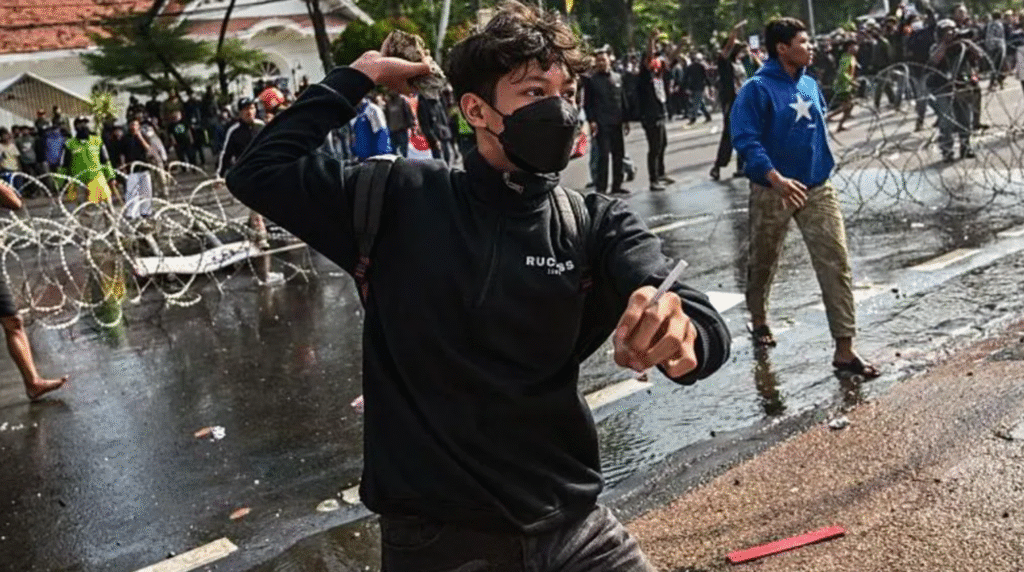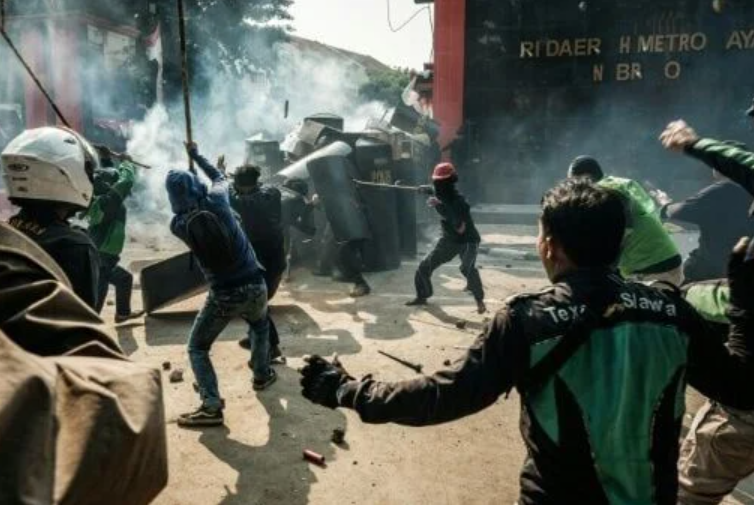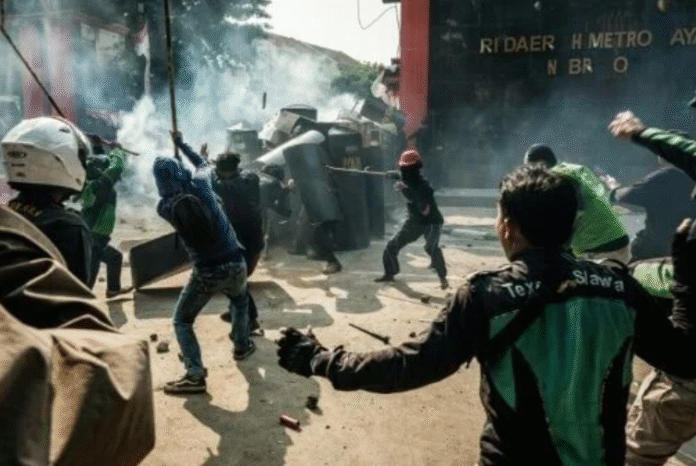Indonesia Protest Taxi Driver Sparks Nationwide Unrest
The tragic death of a young taxi driver in Jakarta has ignited massive Indonesia protest taxi driver demonstrations across major cities, leading to violent clashes with police forces. The protests, which began after the fatal incident involving 21-year-old Affan Kurniawan, reflect broader frustrations over corruption, rising living costs, and controversial government perks for lawmakers.
On Thursday night, Kurniawan, a ride-sharing driver with Gojek, was struck by a police vehicle during demonstrations. His passing not only intensified grief but also triggered a wave of anger that continues to sweep the nation.

Funeral of Affan Kurniawan Becomes Symbol of Protest
Kurniawan’s funeral on Friday drew thousands of mourners, including fellow Gojek riders, students, politicians, and everyday citizens. Many wore the company’s signature green jackets to honor their fallen colleague.
High-profile figures such as Jakarta police chief Asep Edi Suheri, former Jakarta governor Anies Baswedan, and politician Rieke Dyah Pitaloka attended, calling for peace while urging authorities to ensure a thorough investigation. Even President Prabowo Subianto issued a public apology, admitting he was “shocked and disappointed” by what he described as excessive police actions.
Drone footage of the funeral revealed thousands marching alongside Kurniawan’s casket, with chants demanding justice echoing across Jakarta.
Escalating Clashes Between Protesters and Police
The Indonesia protest taxi driver movement has rapidly evolved from mourning to confrontation. By Friday evening, clashes intensified in Jakarta, Surabaya, Bandung, and Medan. Police deployed water cannons, tear gas, and armored vehicles against demonstrators, while some protesters responded with Molotov cocktails, fireworks, and stones.
In central Jakarta’s Kwitang district, protesters attempted to block police convoys. Chants of “Arrest the damn officers” could be heard, as demonstrators marched toward the Indonesian National Police headquarters.
Despite heavy rainfall, the unrest did not subside. Instead, the tension grew as university students joined, further amplifying demands for justice.
Why the Indonesia Protest Taxi Driver Movement Matters
While Kurniawan’s death was the spark, the protests reflect deeper discontent. Many Indonesians are struggling under:
-
Low wages compared to high living costs.
-
Rising taxes and insufficient job opportunities.
-
Anger over lawmakers’ housing perks, including a new monthly allowance of 50 million rupiah ($3,030), nearly 10 times Jakarta’s minimum wage.
-
Widespread frustration with corruption in political and law enforcement institutions.
These issues have turned Kurniawan’s death into a national symbol of injustice, rallying thousands who believe the system favors elites while neglecting ordinary citizens.
Police Accountability Under Scrutiny
The Indonesian police have faced criticism before, but this case has placed them under intense public examination. Seven officers from the Mobile Brigade Corps (Satbrimob) were officially found guilty of violating the police ethics code.
Jakarta’s governor Pramono Anung also met with Kurniawan’s grieving family, offering condolences and financial assistance for funeral arrangements. However, activists argue these gestures are insufficient without transparent legal accountability.
Rights groups such as Amnesty International have frequently raised concerns about police violence in Indonesia, urging reforms to restore public trust.

Gojek’s Response and Rider Solidarity
Kurniawan’s employer, Gojek, released a heartfelt statement honoring him:
“Behind every green jacket, there’s a family, prayers, and struggle. Affan Kurniawan was part of that journey, and his departure leaves deep sorrow for all of us.”
The company pledged support for his family, but for fellow riders, the fight goes beyond mourning a colleague. It represents a demand for fairer treatment, justice, and dignity for Indonesia’s working class.
Political Impact on Prabowo Subianto
The unrest is a critical test for President Prabowo Subianto, who has been under pressure to address Indonesia’s economic inequalities. His apology to Kurniawan’s family highlights the seriousness of the situation.
However, critics argue that unless systemic reforms are implemented, including wage increases, lower taxes, and anti-corruption enforcement, the protests may escalate further.
This moment could shape not only his presidency but also Indonesia’s political trajectory in the years ahead.
International Attention and Comparisons
The Indonesia protest taxi driver tragedy has drawn international attention, with global media outlets comparing it to other high-profile incidents where police actions sparked nationwide protests, such as those in the United States and France.
Southeast Asia analysts warn that if public anger remains unaddressed, Indonesia could face sustained social unrest, potentially destabilizing the region’s largest democracy.
Conclusion: A Nation Demanding Change
The death of Affan Kurniawan has gone beyond one tragic accident. It has become a symbol of resistance for ordinary Indonesians who feel left behind by their leaders.
The Indonesia protest taxi driver movement highlights both the grief of losing a young life and the broader fight for justice, equality, and accountability.
As thousands continue to march despite heavy rain and police crackdowns, one thing is clear: this movement is far from over.

